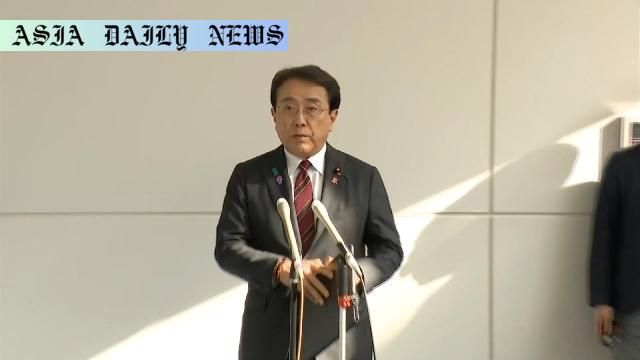Tariff Negotiations: Japan prioritizes reaching an agreement on tariff policies with the US, sets constructive discussions in motion.

Japan’s Perseverance in Tariff Negotiations with the US
The recent discussions between Japan and the United States regarding contentious tariff policies have become a focal point in international trade diplomacy. Akazawa Ryosei, Japan’s Economic Revitalization Minister and chief negotiator, has returned to Tokyo following a series of intense discussions held in Washington, D.C. During his visit, Akazawa met with President Donald Trump, Treasury Secretary Scott Bessent, and other key US officials to address tariff measures that Japan has described as ‘extremely regrettable.’ These meetings represent the first formal discussions on this critical issue under the current administrations in both Tokyo and Washington.
Akazawa’s remarks at Tokyo’s Haneda Airport shed light on Japan’s firm stance on the matter. He stated that Japan has conveyed its national interest clearly, urging the US to reconsider its tariff measures while promising unyielding efforts towards securing an agreement that aligns with Japan’s economic priorities. This diplomatic exchange underscores the complexities of modern trade negotiations, where national interests often clash with the global economy’s intricacies.
Challenges and Path to Early Resolution
The discussions in Washington marked a promising yet challenging milestone. While both countries agreed to aim for an early resolution, significant gaps remain. Prime Minister Ishiba Shigeru has emphasized the government’s priority on these negotiations, stating in Japan’s Upper House that ministerial-level discussions will continue. Ishiba pointed out that while the US administration views trade negotiations with Japan as critical, the evolving nature of the tariff policies adds complexity at every turn.
Efforts to protect Japan’s economic stability amidst rising US protectionist policies have been echoed in skepticism from opposition legislators. They questioned Trump’s intentions and sought clarification on the direction of the negotiations. Ishiba responded by affirming the government’s commitment to studying this impact and taking appropriate measures. While he refrained from announcing new economic stimulus packages, Ishiba suggested that a direct dialogue with President Trump could potentially mitigate the issue further.
Broader Implications and Future Trajectory
The results of these negotiations hold significant implications not only for Japan and the United States but also for international trade at large. This moment captures a shifting dynamic where key players reevaluate their positions to align with changing economic environments. Japan’s resolve to defend its national interest in the face of stringent US tariff policies demonstrates a delicate balancing act between maintaining economic ties with a significant trade partner while safeguarding domestic interests.
Looking forward, the Japanese government appears to be poised for more rounds of discussions before the month’s end. The possibility of escalating negotiations to the ministerial level or even a direct exchange between Prime Minister Ishiba and President Trump signals the importance of this issue. Japan’s proactive stance, coupled with its emphasis on constructive dialogue, sets the stage for potential breakthroughs that could recalibrate bilateral economic relations.
The Need for Global Cooperation
As international trade systems become increasingly interconnected, the Japan-US tariff negotiations serve as a microcosm of a larger dynamic. This is a critical moment for fostering global economic cooperation. Trade policies that heavily favor one party over another can trigger destabilizing effects that ripple through the global economy. This is why Japan’s insistence on achieving mutually beneficial outcomes in its discussions with the US resonates as a call for fairness in a quickly evolving trade landscape.
In conclusion, the ongoing tariff talks between Japan and the United States are much more than just an exchange of economic strategies. They reflect the pivotal role of diplomacy, the necessity of equitable practices, and the resilience of global trading partnerships in the face of emerging challenges. The coming weeks will likely define the trajectory of these negotiations and set a precedent for how the world approaches trade disputes in the future.
Commentary
Complexities in Tariff Negotiations
Negotiating tariff policies requires not only a keen understanding of economics but also a strong commitment to national interest within a global framework. The recent discussions between Japan and the United States highlight the intricacies of balancing these priorities. Akazawa Ryosei’s diplomatic efforts in Washington have shown that Japan is not willing to compromise its economic values while addressing the broader risks of an escalating trade conflict. This commitment to fairness is commendable and essential for creating a stable trading ecosystem.
The US Stance and Its Global Implications
From the perspective of the United States, prioritizing trade relations with Japan reflects its recognition of Japan’s critical role in the global economy. However, the evolving nature of US tariff policies underlines a shifting narrative, placing protectionism at the forefront while potentially straining longstanding alliances. This must be a critical consideration as both nations look to resolve their differences. Fair trade must remain the core principle, ensuring that neither side feels exploited or marginalized during negotiations.
Future Prospects and the Path Forward
A successful resolution to these negotiations could pave the way for a strengthened Japan-US relationship, fostering a more collaborative approach to international trade issues. Japan’s emphasis on continual dialogue and constructive discussion illustrates its pragmatic approach toward reaching a mutually beneficial outcome. Nevertheless, achieving this goal will require patience, compromise, and a willingness to adapt to evolving economic complexities on both sides.
Ultimately, this is a moment to anticipate not only the results of these negotiations but also the valuable lessons they may impart to the broader international community. As nations increasingly navigate the challenges of globalization and shifting power dynamics, constructive dialogue like this may serve as the blueprint for resolving future trade disputes on a global scale.


